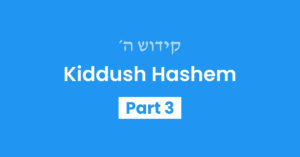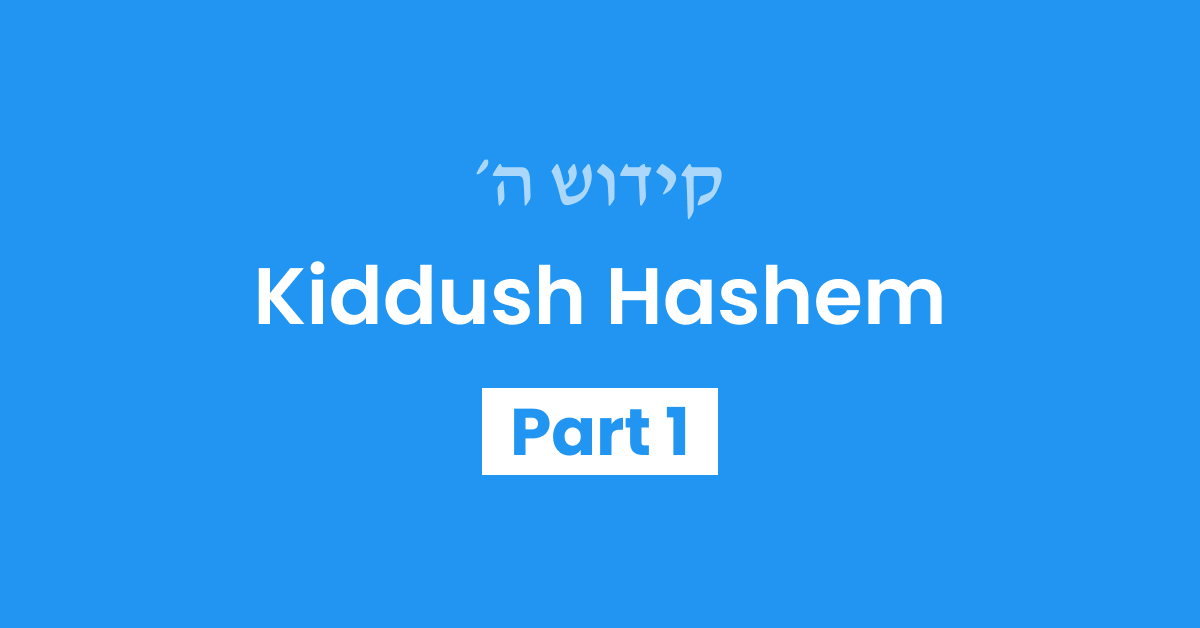We have been learning this month about Kiddush Hashem – sanctifying the name of Hashem in this world. Last week, we explained how the whole purpose of this world is to bring honor to Hashem and help the entire world recognize Hashem as our Creator. For as long as we are in galus, Hashem’s presence is hidden. We therefore yearn and daven for the times of Mashiach, when Hashem’s presence will finally be revealed and the whole world will come to recognize Hashem as our King.
When we think about the tremendous Chillul Hashem that is still present in this world, the situation can feel like it’s out of our control… There is only so much we can do to stop other people from making a Chillul Hashem! We can daven that there wont be any more atheists, and that everyone should recognize Hashem as our Creator… but, ultimately, we cannot control the actions of other people and we cannot control their choices.
So what else can we do?
Is there anything else we can do to bring the world closer to its ultimate purpose and relieve a bit of the pain of the Shechinah (Divine Presence)?
Two Types of Galus
The answer is definitely yes! Chazal teach us that every time we do a mitzvah, it makes a Kiddush Hashem and increases awareness of Hashem on this earth.
Every time we do a mitzvah, it makes a Kiddush Hashem and increases awareness of Hashem on this earth.
When I say Asher Yatzer after using the bathroom, it demonstrates that I recognize Hashem as the Creator of my body, and that He is the only One who decides how healthy I will be. When I refrain from chopping vegetables too small on Shabbos, it shows that I accept Hashem as my King and prefer to fulfill His wishes rather than have the type of salad I wish to have. When I shake the lulav on Sukkos, it shows that I accept Hashem as my King and dedicate myself to fulfilling His commands, even when I don’t understand why He wants me to do this.
Every time we do a mitzvah, it brings tremendous honor to Hashem and helps reveal His presence a little more in this world.
Every time we do a mitzvah, it brings tremendous honor to Hashem and helps reveal His presence a little more in this world.
As Rav Dessler1 explains, there are 2 types of Galus (exile):
One type of Galus is the “global” Galus – that Hashem’s presence is hidden from mankind as a whole. But there is a second type of galus, and that is the personal galus that each of us experiences in our minds and hearts. The more we allow ourselves to forget Hashem and let His presence be hidden from our awareness, the more we are living in personal “galus.” But the more we think about Hashem and train ourselves to be aware of His presence, the more we experience personal “geulah” (redemption).
This is the meaning of the teaching of Chazal2: “Anyone who experiences pain over the destruction of the Beis Hamikdash merits to see it rebuilt.” Why does the Gemara say that he “merits” to see it rebuilt – in present tense? Why didn’t the Gemara say the he “will merit” in the future?
The answer, as Rav Dessler explains, is that a person who feels the pain of the destruction of the Beis HaMikdash is actually tapping in right now to the experience of Geulah. Since “geulah” is defined as a time when Hashem’s presence is revealed in this world, we can each experience our own drop of geulah by noticing Hashem’s presence more and more in our own minds and hearts. Chazal were telling us that a person who is truly pained by the fact that Hashem’s presence is hidden in this world is actually experiencing his own personal geulah right now, because he is keenly aware of Hashem and yearning to see His glorious Kingship revealed on this earth.
A person who feels the pain of the destruction of the Beis HaMikdash is actually tapping in right now to the experience of Geulah.
This week, let’s try to be like these people who truly mourn over the pain of Galus, and yearn to see Hashem’s presence revealed on this earth. Let’s concretize these feelings of yearning by doing whatever we can to increase our awareness of Hashem right now in our personal lives – whether by saying brachos with kavannah, davening with focus, or doing mitzvos with the intent to honor Hashem as our King.
Sources: [1] Michtav Mei’Eliyahu, Vol 2 pg. 47; [2] Taanis 30b;
Your Challenge
Once a day, do a mitzvah with the intent to honor Hashem and increase awareness of Hashem in your personal life.
As you do the mitzvah, think, “I’m doing this mitzvah to make a Kiddush Hashem and increase awareness of Hashem in this world.”
FOR EXAMPLE:
- Say Asher Yatzar with the intent to thank Hashem for creating you with a functional body.
- Say a bracha to acknowledge that your food comes from Hashem.
- Give tzedakah while you contemplate that all money truly belongs to Hashem, so it behooves us to use our money take care of His children.
- Prepare for Shabbos / clean the house / cook for Shabbos with the intent that by honoring the Shabbos, you are giving testimony to the fact that Hashem created this world.
- Do any mitzvah while thinking about how you want to honor Hashem as your King and you accept His commands even if you don’t understand the reasons behind them.
Torah Questions
- When the Jewish people were in the Midbar (desert), there was a Jewish prince named Zimri who did an inappropriate act with a Midianite woman in front of the entire Jewish nation. This was a big Chillul Hashem, and no one knew what to do… until one person got up and made a big Kiddush Hashem by killing them both. Which person made this big Kiddush Hashem? (See Bamidbar 25)
- How was this person rewarded for his actions? (See Bamidbar 25:11 with Rashi)
- Which 3 people gave up their lives to die for the sake of making a Kiddush Hashem in Sefer Daniel? (Or see Rashi on Vayikra 22:32)
- What does the Gemara (Shabbos 33a) predict will happen to the world as a punishment if people make a Chillul Hashem?
Questions to Ponder
- Rav Dessler writes that even though it’s great to make a big Kiddush Hashem in public, a person should first work on making a Kiddush Hashem in private. What do you think it means to make a Kiddush Hashem “in private”? And what advantage would this have over making a Kiddush Hashem in public?
- When Hashem wrote the mitzvah of Kiddush Hashem in the Torah, He indentified Himself as, “I am Hashem who made you holy and took you out of Egypt.” Why do you think the fact that Hashem took us out of Egypt is relevant to the mitzvah of Kiddush Hashem?
- The Gemara says that most sins can be rectfied through Teshuva and Yom Kippur, but the sin of Chillul Hashem can only be rectified through death. Why do you think this is so?




